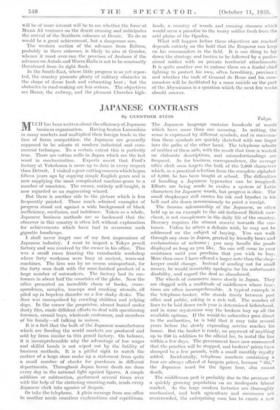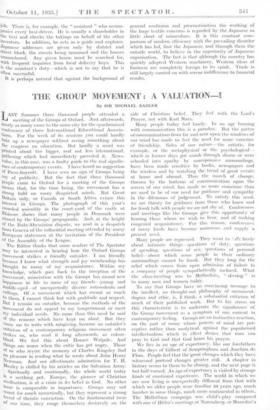JAPANESE CONTRASTS
MUCH. has been written about the efficiency of Japanese business organisation. Having beaten Lancashire in many markets and multiplied their foreign trade in the face of fierce competition, the Japanese are generally supposed to be. adepts at modern industrial and com- mercial technique. To a certain extent this is perfectly true. There are cotton mills in Japan which are the last word in mechanisation. Experts assert that Ford's factory at Yokohama is more up to. date in every respect than Detroit. I visited a gear-cutting concern which began fifteen years ago by copying simple English gears and is now supplying the most complicated machine-gears to a number of countries. The owner, entirely self-taught, is now regarded as an engineering wizard.
But there is another side to the picture which is less frequently painted.. Those much admired examples of progress stand out against a wide. background of black inefficiency, confusion, and indolence. Taken as a whole, Japanese business , methods are so backward that the observer. in this country is often left without explanation for achievements which have had to overcome such gigantic handicaps.
1 shall never forget one of my first impressions of Japanese industry. I went to inspect a Tokyo pencil factory and was received by the owner in his office. ThiS was a small room fronting the ramshackle workshop where forty workmen were busy at ancient, worn-out machines. The firm was by no means unimportant, for the forty men dealt with. the semi-finished product of a large number of outworkers. The factory had its cus- tomers in about half the countries of the globe. Now the office presented an incredible chaos of books, corre- spondence, samples, teacups and smoking utensils, all piled up in hopeleSs disorder on a few shaky desks. The floor was monopolised by crawling children and yelping. dogs. In the corner the proprietor, almost buried under dusty files, made diffident efforts to deal with questioning foremen, errand boys, wholesale customers, and members of his talking' in unison. It is a fact that the bulk of the Japanese manufactures which are flooding the world markets are produced and sold by firms similar to this pencil faCtory. On balance, it is incomprehensible why the advantage of low wages and skilful hands is not wiped out by the futility, of business methods. It is a pitiful sight to watch the cashier of a large store make tip a statement from quite a small number of cheeks for purchases in different departments. 'Throughout Japan heroic deeds are done every day in the national fight, against figures. A simple addition or subtraction, performed several times over with the help of the clattering counting-rods, sends every Japanese 'clerk into agonies of despair.
Or take the telephone. A plain message from one office to another needs countless explanatiOns and repetitions. The Japanese language contains hundreds of words which have more than one meaning. In writing, the sense is expressed by different symbols, and in conversa- tion these symbols are quickly sketched with one finger. into the palm of the other hand. The telephone admits of neither of these aids, with the result that time is wasted on elaborate descriptions, and misunderstandings are frequent. As for business correspondence, the average office clerk soon forgets the bulk of the 2,000 characters which, as a practical selection from the complete alphabet of 8,000, he has. been taught at school. The difficulties of handling a Japanese typewriter can be imagined. Efforts are being made to evolve a system of Latin characters for Japanese words, but progress is slow. The small shopkeeper still carries his ink and brushes in his ■ belt and sits down ceremoniously to paint a receipt.
The famous salesmanship of the Japanese, so often held up as an example to the old-fashioned British mer- . chant, is not conspicuous in the daily life of the country. Decency requires the utmost reserve towards the cus- tomer. Unless he utters a definite wish, he may not be addressed on the subject of buying. You can walk through any store in Japan, greeted by friendly bows and exclamations of welcome ; you may handle the .goods displayed as long as you like. No one will come to your assistance until you proclaim that you wish to buy. More than once I have offered a larger note than the shop- keeper could change. Instead of sending out for small money, he would invariably apologise for his unfortunate disability, and regard the deal as abandoned.
The wheels of commerce move slowly in Japan. They , are clogged with a multitude of middlemen whose func- tions arc often incomprehensible. A typical example is the 'telephone-broker, who stands firmly between post office and public., raking in a rich toll. The number Of, lines to be laid down each year is determined befOrehand, and in some mysterious way the brokeri buy up all the available options. If the would-be subscriber &CS—direct • to the authorities, he is told that it may take several years before the sloWly expanding service reaches his house. But the broker is ready, on payment Of anything up to £60 in addition to the official fee, to instal the line. within a few days. The government have now announced , that the practice will be stopped, and brokers' prices have slumped to a few pOunds, with a small monthly royalty added. Incidentally, telephone numbers containing a four are,always offered at bargain prices, because " Shl,'' . the 'Japanese Word for the figure four, also means death.
The middleman peSt is probably due to the presSure'oe, a quickly growing population on an inadequate labour market. As the large modern factories are thoroughly mechanised, and both, agriculture and commerce are overcroWded, the enterprising man has to create a new , job. There is, for example, the " assistant who accom- panies every taxi-driver. He is usually a shareholder in the taxi and checks the takings on behalf of the other investors. In addition, he acts as a guide and explorer. Japanese " addresses are given only by district and street block, the streets being unnamed and the houses unnumbered: Any given house must be searched for, With frequent inquiries' from local delivery boys. This is the assistant's duty—which is not to say that he is Often succesSful; It is perhaps natural that against the background of general confusion and procrastination the working of the large textile concerns is regarded by the Japanese as little short of miraculous. It is this constant corrt. parison of modern efficiency with the prevailing disorder which has led, first the Japanese, and through them the outside world, to believe in the superiority of Japanese organisation. The fact is that although the country has quickly adopted Western machinery, Western ideas of business are completely foreign to its spirit. Trade is still largely carried on with serene indifference to financial results.































































 Previous page
Previous page